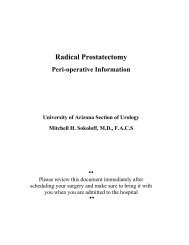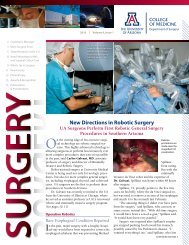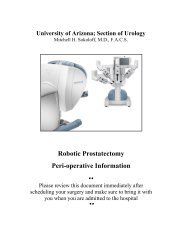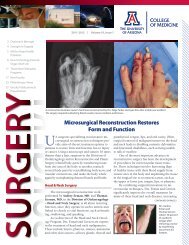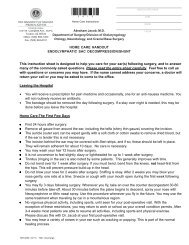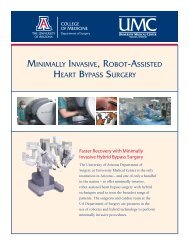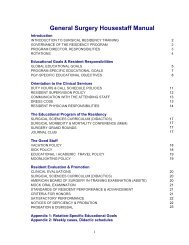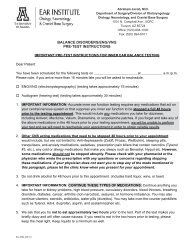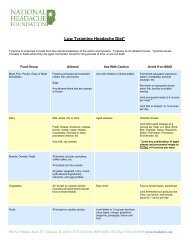Exploring a Cochlear Implant
Exploring a Cochlear Implant
Exploring a Cochlear Implant
- No tags were found...
Create successful ePaper yourself
Turn your PDF publications into a flip-book with our unique Google optimized e-Paper software.
IntroductionMore than 36 millionAmericans have somedegree of hearing loss —approximately one in10 individuals. 1Why wait whenyou can experiencesound today?Whether it happens suddenly or gradually over time, hearingloss can isolate you from the rest of the world, disconnectyou from family and separate you from friends andco-workers. This alienation can lead to feelings of depressionand loneliness. It can also leave you feeling increasinglyfrustrated and exhausted handling all the extra challengesassociated with trying to live a full, productive life in ahearing world. Yet, the fact that you are reading abouthearing loss solutions shows that you are thinking aboutmaking a change and you’re taking the first step toward aricher world of sound.1More than 188,000 people worldwidehave received a cochlear implant. 2<strong>Cochlear</strong> implants are covered bymany private insurance policies, aswell as Medicare and Medicaid. FDAapprovedcochlear implants havebecome recognized as an establishedtreatment for restoring hearing in adultsand seniors with severe to profoundsensorineural hearing loss. In fact,cochlear implants have increasinglybecome the solution for people withsevere to profound hearing loss who nolonger receive benefit from hearing aids.We understand you want to enjoy the priceless momentsin life with friends and family on the phone, to recognizeyour favorite song playing on the radio, or participate indaily office conversations. And don’t you deserve to go to aparty and enjoy a fun evening of conversing with friends andmaking new acquaintances? Everyday occurrences like theseenhance one’s quality of life.Your journey begins here.“I am like a differentperson now.Eiko T., cochlear implant user2FUN1320 HLAA Adult Education Brochure 7.indd 3-45/12/11 9:36 AM
Ask yourself thefollowing questions:“My cochlear implant gave meback not only my hearing, butmy old self.”Kimino S., cochlear implant userEven with powerful hearing aids,do you:❏ Hear but not understand?❏ Have to ask people to repeat themselves duringone-on-one conversations, even in a quiet room?❏ Need captions on to understand television programs?❏ Avoid social activities because you don’t know what’s beingsaid and are afraid you may respond incorrectly?❏ Depend on lip-reading to understand a conversation?❏ Find yourself exhausted at the end of the day becausecommunication requires such a high degree of concentration?❏ Have a hard time keeping up at work? Do you findcommunication at work to be difficult and to interfere withcarrying out responsibilities of your job?❏ Have trouble hearing on the phone?❏ Avoid making and answering phone calls?❏ No longer enjoy listening to music?❏ When tested by your audiologist with your hearing aidson, do you score less than 60% on your ability torepeat sentences?3If you answered yes to any of these questions, you may bea good candidate for a cochlear implant. Your hearing healthcare professional can tell you more.NOTE<strong>Cochlear</strong> implants are indicated for adults, age 18 and older,who have moderate-to-profound or poorer sensorineuralhearing loss in both ears and who have demonstrated limitedbenefit from wearing hearing aid(s) binaurally (in both ears).<strong>Cochlear</strong> implants are approved for children 12-24 monthswith profound hearing loss in both ears and children 2-17years with severe-to-profound hearing loss in both ears.4FUN1320 HLAA Adult Education Brochure 7.indd 5-65/12/11 9:36 AM
Nearly 80% of peoplewho received a cochlearimplant within a year offinding out they werecandidates said theywould get a cochlearimplant sooner if theycould do it over. 3A cochlear implant may makea big difference in your life.Typically, within a short amount of time, you can expect toachieve better speech understanding. Research has shownthat adults receiving cochlear implants may on averageunderstand sentences almost seven times better than theycould with hearing aids. 4An implant may help you enjoyeveryday moments like:• Talking on the phone• Watching and listening to the TV more easily• Participating in work meetings and conference calls• Immersing yourself in your community withhearing people• Communicating better with your family, childrenand grandchildren• Communicating better with friends and co-workers• Talking to people without relying exclusively onlip-reading• Taking a class or discovering a new hobby• Participating more fully in the world5“We all wanted to be sure thatat dad’s age (93), an implant wouldbe the right choice for him. Dad’shearing has improved since hiscochlear implant and he continuesto live independently.”Tom H., son of a cochlear implant user6FUN1320 HLAA Adult Education Brochure 7.indd 7-85/12/11 9:37 AM
For some individuals,a cochlear implant canprovide relatively fastimprovements overhearing aids, especiallyin the crucial area ofspeech understanding.% CorrectPerformance with cochlear implantscompared with best-aided testing withhearing aids 5100806040201273798218546270One study revealed that adults achieve, on average,recognition scores of 79% correct on a sentence test afterusing a cochlear implant for just six months, comparedto an average of 12% understanding pre-implantationwhen using well-fit hearing aids. 50HINT (Quiet) 60dBN = 53Average ScoresHINT (Noise) 60dBN = 53 except for pre-op(with hearing aids, N = 15)Average PerformanceOver TimeN = 53pre-op (with hearing aid(s))3 months6 months12 monthsNOTE7Age is not an indicator of who can benefit from acochlear implant. Children as young as 12 months andseniors well beyond 80 years of age can be candidatesfor a cochlear implant.The HINT (Hearing in Noise Test) is a sentenceunderstanding test. Sentences are spoken by aperson in a quiet background or in the presenceof background noise. People wearing hearing aidsor cochlear implants are asked to listen to thesentences and then repeat as many words fromthe sentence as they were able to hear. Repeatingthe words is more difficult in the presence ofbackground noise. In the above study, the testwas performed on people wearing hearing aid(s)prior to their implant surgery, then the same testwas later performed after their surgery with themusing a cochlear implant.8FUN1320 HLAA Adult Education Brochure 7.indd 9-105/12/11 9:37 AM
How to get theinformation you needFind a hearing clinic andhealth care team thatmeets your needsYou should be completely comfortable with your audiologist,since the two of you will be working together throughout theprocess – before, during and long after you get a cochlearimplant. Your implant team should always invite your feedbackand questions. There are no wrong questions, and you shouldfeel free to ask as many as you need.Consulting with a cochlear implant professional can helpto ensure that you receive all the information you need tomake an informed decision. If you are at a loss for referrals,there are many online and phone services to help youlocate a clinic and an audiologist in your area.Talk to cochlear implant usersBecoming educated about cochlear implants and meetingothers who have them are critical steps toward the rightdecision. Consider reaching out to others who have cochlearimplants. They have first-hand experience and tips to share.There are several supportive communities, including oneswithin the Hearing Loss Association of America, which hostmeetings, events, workshops and online message boards. Thesegroups can answer your questions and guide your expectationsabout cochlear implants.We encourage you to ask questions and to learn more aboutcochlear implants by accessing any or all of these free services.To easily connect to unbiased communities of cochlear implantrecipients, please visit cochlearimplantonline.comFACTOther trusted organizationsyou can go to for moreinformation are:• American Academy of Audiology (AAA):www.audiology.org• American Speech-Language-Hearing Association (ASHA):www.asha.org• American Academy of Otolaryngology (AAO-HNS):www.entnet.orgIn the back of this guide, you will find acomprehensive list of resources whereyou can obtain additional information.“What a joy to be able toparticipate in conversationsagain and hear the radio! I feelthat I have my life back thanksto cochlear implants.Lisa S., cochlear implant userA cochlear implant is covered by approximately 90% ofprivate health plans, as well as Medicare and Medicaid.These insurers may also cover bilateral cochlear implantsas long as you meet certain medical criteria.99 10FUN1320 HLAA Adult Education Brochure 7.indd 11-125/12/11 9:37 AM
How hearing worksDesigned to work the way yourears do — cochlear implantsmimic natural hearingDeep in your ear is a remarkable, pea-sized structurecalled the cochlea. Tiny, delicate hair cells in the cochleacommunicate sound signals to your brain, allowing you tohear different pitches and sounds. Depending on the extentto which these delicate cells are damaged, you can lose someor all of your ability to hear.1234<strong>Cochlear</strong> implants are designed to compensate for thedamaged cells, helping to restore your ability to perceivesounds and understand speech. A cochlear implant worksby bypassing the damaged part of the inner ear and sendingdigitized electric sound signals directly to the hearing nerve.Luz A., cochlear implant user1234How natural hearing worksSounds enter the ear canal and travel to the eardrum.These sound waves cause the eardrum to vibrate,sending the bones in the middle ear into motion.This motion is converted into electric impulses bytiny hair cells inside the inner ear (cochlea).These impulses are sent to the brain, where they areperceived by the listener as sound.1314FUN1320 HLAA Adult Education Brochure 7.indd 15-165/12/11 9:37 AM
112442 33A hearing aid amplifiessounds introduced from the outerear to the middle and then inner ear.A cochlear implant systemhas two parts: an external speech/sound processor and an internal implant.How a hearing aid worksHow a cochlear implant works1The microphone in the hearing aid picks up sound andsends it to the amplifier where it makes it louder.1The microphone in the external sound processorcaptures sounds, then filters and processes the sounds.2The receiver of the hearing aid sends the amplifiedsound down the ear canal, causing the eardrum andthe middle ear bones to vibrate.2The sound processor translates the filtered sounds intodigital information, which is then transmitted to theinternal part of the implant system.34Motion transferred to the cochlear fluids isconverted into electrical impulses by tiny hair cellsinside the cochlea.These impulses are sent to the brain, where theyare perceived as sound.Unfortunately, even the most powerful hearing aidsmay not help people with severe to profound hearingloss because making sounds louder does not alwaysmake them clearer.34The internal implant converts the digital informationinto electrical signals, and sends them to a tiny,delicate curl of electrodes that sits gently insidethe cochlea.The electrical signals from the electrodes stimulatethe hearing nerve. This bypasses the damaged haircells that result in hearing loss, and allows the brainto perceive sound.1516FUN1320 HLAA Adult Education Brochure 7.indd 17-185/12/11 9:37 AM
FACT17Two ears are betterthan oneBimodal hearing is a good solutionfor many who have some residualacoustic hearing in the ear oppositethe implant“Bimodal hearing” refers to a hearing aid in one ear and acochlear implant in the other ear. This approach combines thebenefits of acoustic stimulation (hearing aid) with those ofelectric stimulation (cochlear implant) for potentially improvedspeech understanding in quiet and noise and/or improved musicenjoyment for many patients. 6Bilateral implants are alsoan optionSometimes, cochlear implants in both ears (bilateral implants)may be appropriate. This is especially true if you receive little orno benefit from a hearing aid in either ear. Bilateral implants arean option you should discuss with your audiologist or hearinghealth care professional.In a review of clinical studies testing speech understanding,it has been shown that some people hear better whenwearing a cochlear implant in one ear and a hearing aid inthe other ear than when wearing a cochlear implant alone. 7Research also shows that hearing can be improved withsuch bimodal hearing even in noisy situations. 8“...it is helpful to connect withpeople who have undergone theimplant surgery and activation.Through the Hearing LossAssociation of America... I wasable to learn from their variousexperiences so I could make myown informed choice to havesimultaneous bilateral cochlearimplants. I am happy andthrilled with the results.”Amy B., cochlear implant user% hearing aid use in the non-implanted ear403020100Bimodal hearing is becoming10%2002 936%2008 10a more popular option18FUN1320 HLAA Adult Education Brochure 7.indd 19-205/12/11 9:37 AM
19What to considerwhen choosing acochlear implantNot all cochlear implantsare the sameIn general, all cochlear implants are designed to restoresound in a similar fashion, but each brand does havedifferences. It’s important to understand the differencesbetween cochlear implant systems and ask the rightquestions before choosing the best device for you.The highly technical languageassociated with today’s cochlearimplants can be intimidating.The following simplified criteriaand useful tips are a good wayto help narrow your search:✓ <strong>Implant</strong> reliability<strong>Implant</strong> reliability is a crucial factor when selecting acochlear implant, particularly since the implant itselfshould be designed to last a lifetime. Be sure to askyour audiologist and cochlear implant surgeon aboutan implant’s performance record and whether there isa known history of technical complications or problemswith a particular brand or model.Manufacturers must report their reliability data,measured in terms of Cumulative Survival Rate (CSR).The data may be difficult to understand and, initially, allof the data may look the same, but there are noticeabledifferences. It’s important to review a product’s recordbeyond the first year of implantation, and ask youraudiologist and cochlear implant surgeon about eachimplant manufacturer’s record.✓ Flexible for an active lifestyleThe durability and versatility of the cochlear implantsystem should allow you to engage in everyday activities— listening to music, talking on the phone, exercising,playing sports — with minimal disruption. Depending onyour lifestyle, you may want to consider a device that iscertified as water-resistant.The external sound processors come with differentoptions for batteries. Manufacturers may offer deviceswith the option of either rechargeable or disposablebatteries — some offer the flexibility of both. Withrechargeable batteries, the battery life varies bymanufacturer, so you’ll want to ask how long you canexpect batteries to last. Disposable batteries are idealfor those times when you are in conditions or areaswithout electricity, such as power outages or whentraveling and camping.What is CSR?<strong>Implant</strong> reliability statistics areexpressed in terms of the CumulativeSurvival Rate (CSR), a standardestablished by the InternationalStandards Organization (ISO). TheCSR standard indicates the likelihoodthat a device will function properlyduring a given period of time. You willwant to review the track record ofeach company’s products at both yearone and beyond in order to make aninformed decision.20FUN1320 HLAA Adult Education Brochure 7.indd 21-225/12/11 9:37 AM
✓ Reputation✓ Speech understandingperformanceFor many people the primary factor in choosing acochlear implant system is the device’s ability toimprove speech perception and understanding ineveryday situations. Although other benefits, suchas music enjoyment, are also considered importantoptions, experts agree that speech understandingshould be considered the first priority.✓ Access to futuretechnology upgradesMost cochlear implant systems are future-ready so youcan benefit from new technological innovations withoutthe need for additional surgery. A future technologyupgrade can be a software upgrade, a hardware orsound processor upgrade, or an implant upgrade.You’ll want to know whether you can easily upgradeyour processor as new technology becomes available.This is an important consideration when selecting acochlear implant system because you will need to livewith yours for years to come. It is also important toknow that the company you select is committed toinvesting in new, improved technologies and will makethem readily available to their customers. It might bereassuring to meet cochlear implant users who receivedimplants 25 years ago and continue to have access tothe advanced processors available today.Be sure to choose a company that you trust to be therethroughout your lifetime. In addition to asking for ahearing health care professional’s recommendations,talk with other people who have cochlear implants.It’s also beneficial to contact each manufacturerand ask questions. You can tell a lot just by spendinga few minutes speaking directly with a companyrepresentative. Be sure to ask about implantreliability, speech understanding, flexibility andcompany reputation.✓ Rehabilitation andeducational servicesRehabilitation is vital to achieving the best possiblehearing and speech outcomes. As the saying goes,“practice makes perfect.” No matter how good thecochlear implant is, success depends on the decisionsof the individual recipient, the audiologist, hearingrehabilitation specialist, and health care team workingtogether and investing time in ongoing rehabilitation.Consider the rehabilitation and educational supportprovided by each manufacturer and whether it servesyour needs. Be sure to team up with a rehabilitationspecialist early on.Eiko T., cochlear implant user2122FUN1320 HLAA Adult Education Brochure 7.indd 23-245/12/11 9:37 AM
Obtaininginsurance coverageUnlike hearing aids, cochlear implants are covered by manyprivate insurance policies, as well as by Medicare and Medicaid.Bilateral implantation may be covered by these insurers alsoif you meet medical criteria. You will need to check for exactrequirements and coverage, as benefit entitlement may differfrom state to state and from plan to plan.If you have commercial insurance, you should check withyour healthcare policy benefits manager to determine exactcoverage and reimbursement. Your plan may require preauthorizationfor certain services. If needed, your audiologistor physician may help you obtain pre-authorization ofcoverage on your behalf. Your plan may also offer you a“pre-determination” of benefits that will provide you withcoverage insurance applicable to your plan.In addition, some manufacturers of cochlear implantsprovide services to help guide you through the insuranceand reimbursement process. These manufacturers usuallyhave dedicated experts to assist you, even if you’re initiallydenied coverage. For best results, be sure to enlist theseservices early on in the process. If you have Internet access,visit the manufacturer’s website and search for insurance orreimbursement support for more information.If you need assistance navigating what can be viewedas a complex process, contact OMS insurance support at800.633.4667 or visit www.omsinsurancesupport.orgThe general process for obtaininginsurance pre-determination fora cochlear implant is usuallysimple. However, there areoccasions where additional steps,such as an appeal, are required.The general process is detailedstep-by-step below:• Patient’s insurance information is collected• Health care provider will contact the insurance companyto confirm benefits and obtain a fax number or addressto send a predetermination letter request• Health care provider submits a predeterminationletter explaining the procedure and includes the billingprocedure, codes and diagnosis. They may also includea letter of medical necessity from the physician, patienthistory notes, audiograms, CT scan results, etc.• Health care provider/physician follows-up with theinsurance company approximately 10 business days aftersubmission to verify receipt and status of review• If a health care provider tells you that a denial is received,check to see what appeal options are available. If thedenial letter does not specify the appeal options, checkyour health insurance benefit book• Work with your health care provider or a cochlear implantmanufacturer for appeal until approved or until all appealoptions are exhausted2324FUN1320 HLAA Adult Education Brochure 7.indd 25-265/12/11 9:37 AM
25Connecting to aworld of sound12Outpatient surgeryGetting a cochlear implant is usually an outpatientsurgery. The entire cochlear implant procedure takesabout 1-3 hours. Thousands of these surgeries takeplace every year. Typically, the patient goes homelater the same day. In some instances, the patient maystay overnight and be discharged early the followingmorning. Your surgeon will discuss with you the risksassociated with the procedure. In terms of recoverytime, you may find it surprising to learn that mostchildren and adults are able to return to normalactivities in less than a week.Time to activate thecochlear implantThe external sound processor, which is worn on theear, is typically activated within two to four weeksafter surgery. This delay in activation allows for healingtime. Once activated, everyone’s initial experience witha cochlear implant is unique. Most cochlear implantusers say that the sound changes over time and getsbetter every day. Daily practice and listening patienceare essential for success.At the initial activation appointment, your audiologistwill program the device to match your hearing needs.Fine-tuning your settings will likely take more than onesession with the audiologist.34Some devicesoffer customizablesound programmingMost sound processors offer a setting that you can useas your primary program. In addition, some devicesoffer a range of programmable listening options thatcan be adjusted to optimize sounds for differentlistening environments with a simple push of a button.This way, you can change the settings on the externalprocessor to adjust for noisy or quiet environmentsas well as for music. While you might need only oneprogram at the start, your hearing needs are likely tochange in the future.Ongoing care for your lifetimePeople often ask about what happens after thecochlear implant is activated. Important considerationswhen choosing a cochlear implant system include theavailability of technical support from the manufacturerand the length and coverage of product warranties. Itis important for you to be confident knowing you willhave ongoing care for the rest of your life.Rehabilitation post-cochlear implantation should bestandard procedure. A comprehensive rehabilitationprogram can assist a recipient with using the auditorysignal and naturally adapting the technology towardsupporting all types of communication, includinglistening and speaking.Although the technology provides much greateraccess to sound than recipients may have had before,they may still need assistance in learning to recognizeenvironmental sounds, comprehending speech, andimproving their hearing abilities in challenginglistening situations.Some manufacturers offer specialized rehabilitationtools for music and telephone. There are a variety ofrehabilitation resources and tools available. Visityour cochlear implant manufacturer website to learnmore about their offerings.26FUN1320 HLAA Adult Education Brochure 7.indd 27-285/12/11 9:37 AM
27Answers to frequentlyasked questionsQAQAHow will it sound when I get mycochlear implant?It is difficult to explain what your experience will be like.Having a cochlear implant is a journey and it takes timefor the brain to adjust to this new way of hearing sound.Electrical stimulation produces a sound that is differentfrom normal hearing. Personal factors will affect youroverall experience, such as your hearing history before thecochlear implant. Some familiar sounds may seem strangeor harsh at first, and you may have to reshape the way youexperience them. It’s important, at first, to record how youfeel and what sounds are good, not good or unpleasant toyou. You and your audiologist can work together to get thebest outcome for you. Research shows that people whohave received a cochlear implant after wearing hearingaids for many years believe that their quality of life hasimproved as a result of attaining better hearing with acochlear implant. 11How complicated is the cochlear implantsound processor to use?Using a cochlear implant sound processor shouldbe very similar to using a hearing aid. Some cochlearimplant systems allow you to customize your ownexperience based on your needs and comfort level.Depending on the device, you may have the option toremain on one setting or to use different settings toachieve better listening in different environments.QAQAQAAm I too old to get a cochlear implant?As long as there are no medical contraindications,the FDA has approved implantation in children12 months of age or older, and there is no upperage limit for adults.<strong>Cochlear</strong> implants have been demonstrated to have asignificant, positive impact on the health andgeneral quality of life of seniors with significanthearing loss. 11 For seniors living alone or for those withpoor vision, the restoration of hearing provided by acochlear implant can be critical to their ability to liveindependently. The isolation that often accompaniessignificant hearing loss may be mitigated or eliminatedbecause cochlear implant recipients once again enjoysocial, cultural or educational activities that wouldotherwise be difficult or impossible. For the appropriatecandidate, a cochlear implant often provides dramaticlistening improvements.Will the cochlear implantfurther damage my inner ear?<strong>Cochlear</strong> implant design is an important considerationwhen protecting residual hearing is a concern. Someimplants are designed to help protect the delicatecochlear structures of the ear. 12-14 Ask your doctorabout which cochlear implant is best for you.Will insurance cover the cost?Unlike traditional hearing aids, a cochlear implant iscovered by 90% of insurance companies. Medicareand Medicaid cover implantation for appropriatecandidates. Please see page 23 for detailed informationabout cochlear implants and insurance coverage. Theaverage maintenance cost for items such as batteries issimilar to that of high-powered hearing aids.28FUN1320 HLAA Adult Education Brochure 7.indd 29-305/12/11 9:37 AM
QAQAWill I be able to listen to music?Yes, many recipients do report enjoying music witha cochlear implant. But it is important to know thatmusic enjoyment is often different for each individual.Many who have a cochlear implant report being ableto enjoy music right away, while others enjoy musiconly after practicing daily for awhile. Rehabilitationand practice have been shown to improve musicenjoyment. When evaluating cochlear implants,you may want to consider a cochlear implant with aspecialized music setting designed to enhance musicalenjoyment. Talk to your audiologist about musicenjoyment with a cochlear implant.Will I be able to hearon the phone?Many people can hear on the phone with time andpractice. Some companies offer telephone-specificrehabilitation programs to help you get started withtelephone communications. There are also numerousaccessories to help improve your listening experienceon the phone if you need extra help. Visit yourcochlear implant manufacturer’s website to seewhat programs are offered.QAQAHow noticeable is the cochlear implantsound processor on the ear?Today’s sound processors are designed to be as smalland discreet as possible. They come in a variety ofcolors to match hair. The sound processor is somewhatlarger than a very small hearing aid. However, it isgenerally comparable in size to larger high-poweredhearing aids needed by those with severe-to-profoundhearing loss. An additional benefit of a cochlearimplant is that an earmold is not required. Also,unlike hearing aids, cochlear implants do not producefeedback. Many users report that these are wonderfulside benefits.Will I be able to wash my hair,take a shower or swim?Yes, as long as you remove the sound processorbeforehand. Some cochlear implant sound processorsare certified to be water resistant and have an IP44rating so that you can still participate in enjoyablemoments on the beach and around a swimming pool.However, sound processors are not intendedfor swimming.Philip G., cochlear implant user2930FUN1320 HLAA Adult Education Brochure 7.indd 31-325/12/11 9:37 AM
33Reaching theright decisionfor your needsBelow is a summary of keyinformation to guide youtoward the right decision.123Research your optionsMany adults and children with severe to profoundhearing loss may benefit from a cochlear implant.Answer the questions featured on page three todetermine whether you are a potential candidate.Then discuss your options with your hearing healthcare professional team.Learn more about cochlearimplant systemsVisit www.hearingloss.org for a list of cochlearimplant manufacturers.Make an informed decisionEvaluate information about reliability, performanceand reputation of each cochlear implantmanufacturer. You need to be able to trust that thedecision you make will be the right one for you. That’swhy it’s important to ask experts like your audiologistor cochlear implant surgeon about the track recordof each device manufacturer. Not only do you want adevice that will last a lifetime, you want a dependableand reputable manufacturer that will support youwell into the future.NOTEResourcesOrganizations & SupportAmerican Speech-Language-Hearing AssociationNational professional organization which provides generalinformation about hearing loss, hearing aids, assistive listeningdevices and audiology/speech-language pathology services.2200 Research Boulevard | Rockville, MD 20850-3289301.296.5700 | www.asha.orgAmerican Academy of AudiologyThe Academy is the world’s largest professional organization of,by, and for audiologists. The Academy promotes quality hearingand balanced care by advancing the profession of audiologythrough leadership, advocacy, education, public awareness andsupport of research.11730 Plaza America Drive, #300 | Reston, VA 20190800.222.2336 | infoaud@audiology.org | www.audiology.orgAmerican Academy of Otolaryngology -Head and Neck SurgeryThe world’s largest organization representing specialists who treatthe ear, nose, throat, and related structures of the head and neck.The medical disorders treated by these physicians are among themost common that afflict all Americans, young and old.1650 Diagonal Road | Alexandria, VA 22314 | 703.836.4444memberservices@entnet.org | www.entnet.orgHearing Loss Association of AmericaThe Hearing Loss Association of America (HLAA) is a non-profit,consumer organization that opens the world of communication topeople with hearing loss through information, education, advocacyand support. HLAA publishes the bimonthly Hearing Loss Magazine,holds annual conventions, produces the national Walk4Hearing,hosts online learning, and advocates for the rights for people withhearing loss. HLAA has chapters nationwide.7910 Woodmont Ave. Suite 1200 | Bethesda, MD 20814301.657.2248 | info@hearingloss.org | www.hearingloss.orgUse this guide to weigh all your options before taking thenext step. Talk to long-time cochlear implant recipientsand hearing health care professionals in your area, and seewhich device fits you best. You’re taking the right stepstoward an important decision.34FUN1320 HLAA Adult Education Brochure 7.indd 35-365/12/11 9:37 AM




